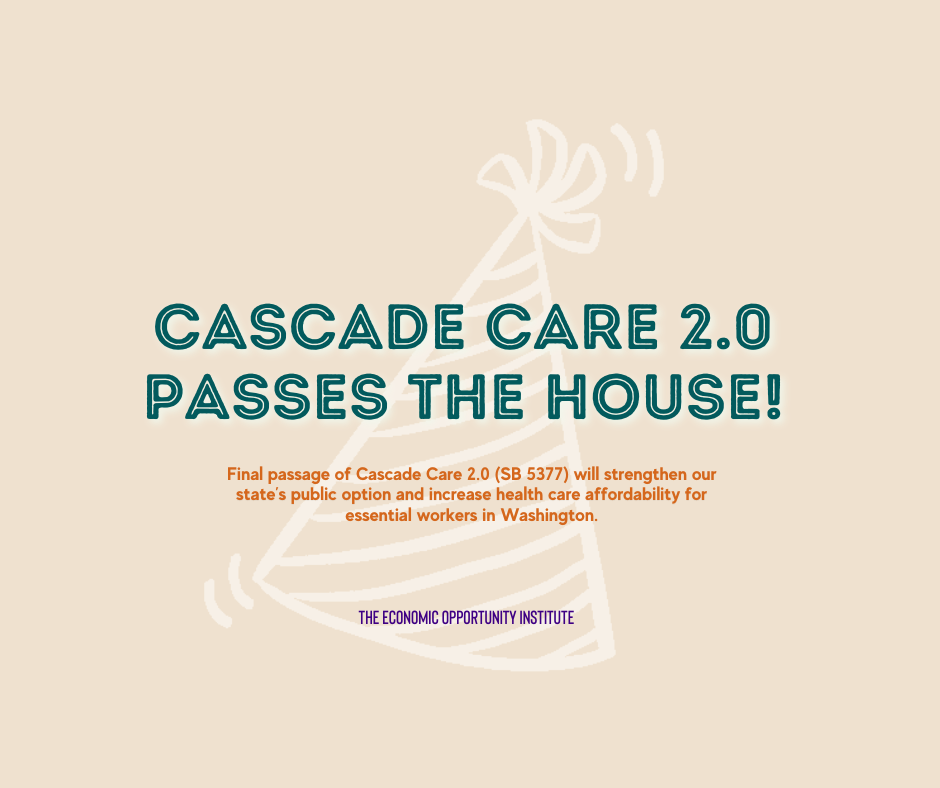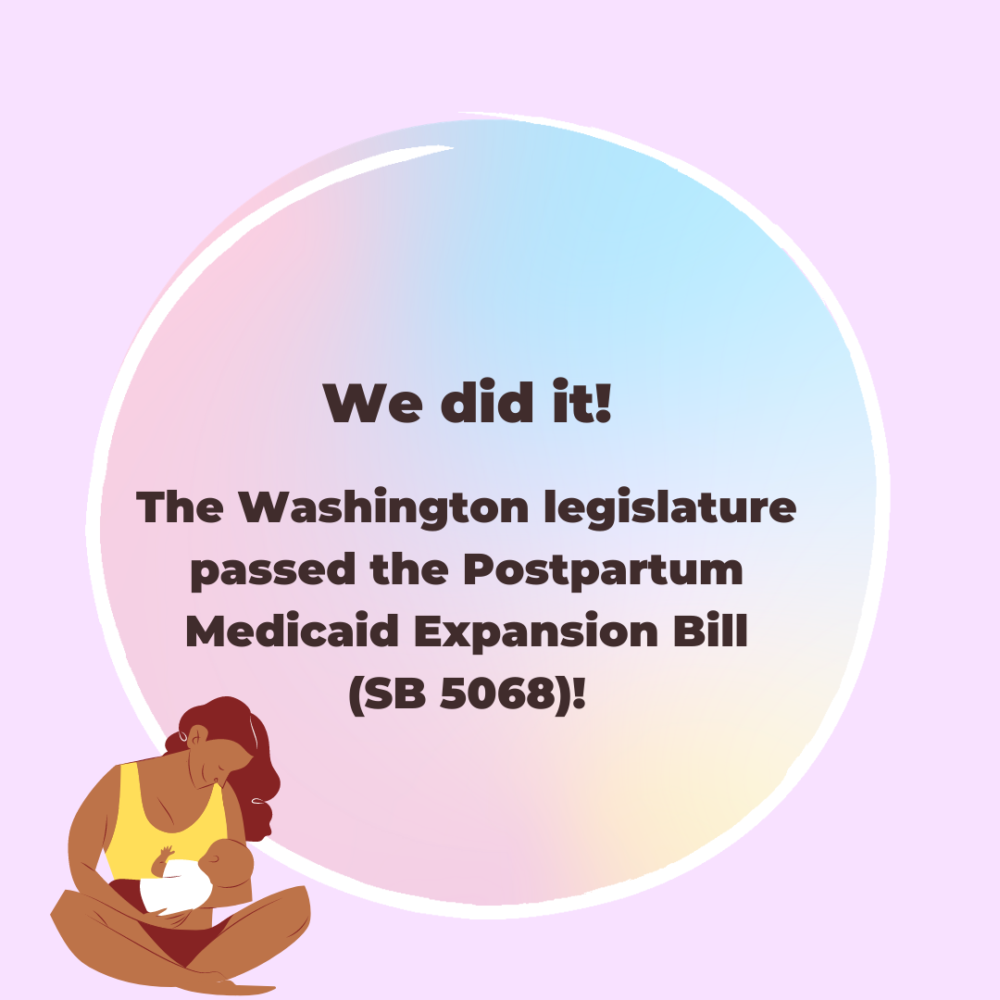Washington’s 2021 legislative session was a banner year for health care reform, from advancing universal coverage, to creating health care subsidies, to expanding Medicaid coverage.
Advocates were cautious at the outset of 2021, given the challenges of conducting a legislative session exclusively online. It was unclear what we might be able to achieve, especially given the bleak budget outlook in late 2020. Concurrently however, our collective resolve only deepened as we aimed to address the glaring inequities facing our communities, made worse by the pandemic and recession – and we’ve won big for our communities as a result.
Legislators and advocates worked hard to carve out new and ongoing funding for health care affordability and public health, behavioral health services, increased health system transparency, and advancing universal coverage.
Cascade Care 2.0 (SB 5377)

Cascade Care “2.0” builds on the first bill from 2019, which created standard plans and a public option, by establishing a state-based premium subsidy and cost-sharing assistance program. The final 2021-2023 operating budget includes $50 million aimed at expanding premium subsidies starting in 2023 for people with incomes up to 250% of the federal poverty level. The bill complements the federal American Rescue Plan passed by Congress in March, which instituted additional federal subsidies and cost-sharing reductions.
As originally introduced by Senator Frockt, the bill included a stronger reimbursement rate cap on hospitals, which would have helped control our skyrocketing health care costs. In the end, this measure was removed due to industry pressure. The final bill does limit non-standard plans on the Exchange and includes a provision to require hospitals that contract with public health programs, including Medicaid and public employee health plans, to contract with at least one public option plan.
Postpartum Medicaid Expansion (SB 5068)
 The bill to extend Medicaid coverage for a full year after giving birth regardless of immigration status passed the Legislature with bipartisan support and was signed into law on April 16 by Governor Inslee.
The bill to extend Medicaid coverage for a full year after giving birth regardless of immigration status passed the Legislature with bipartisan support and was signed into law on April 16 by Governor Inslee.
Senator Randall first introduced this bill in 2020 to address our state’s maternal health crisis, but it was vetoed by Governor Inslee last year after passing the legislature, due to the feared COVID-related budget crisis. The final 2021-2023 budget includes $1.2m to implement and fund the program to expand Washington’s existing Pregnancy Medicaid program. This policy not only allows women up to 198% of the federal poverty level to enroll during pregnancy but also in the year after giving birth, even if they didn’t have Medicaid coverage while pregnant. This ensures coverage for those who may have lost their jobs or health care through a spouse after giving birth.
Ensuring access to health coverage while pregnant and following childbirth will improve women and children’s health, address racial and gender disparities in our state, and will help protect the health and economic security of new families at a vulnerable time.
Coverage for Immigrants
Despite being central to our communities and our economy, immigrants were largely left out of federal pandemic relief packages, which made existing disparities even worse. Immigrant advocates won important victories this session, including pandemic unemployment assistance and clinic-based grant programs to provide health coverage. HB 1191, a bill that would have created lookalike Medicaid and Qualified Health Plan programs for undocumented people left out of federal health care assistance, did not move forward this session. But advocates continued to pressure legislators to create a pathway for health coverage that would meet immediate and long-term health care needs.
The end result is $35m in the final operating budget for clinic-based grant programs to provide care for uninsured and underinsured people, regardless of immigration status. Longer-term, the budget also includes funds to explore enrolling undocumented people in a state-funded health coverage program by 2024, including an option for the Health Benefit Exchange to develop an application for a federal waiver to enable coverage for undocumented people.
In addition to these top health care reform priorities for EOI, health care advocates fought for and won key legislative victories this session, including:
- Creation of a permanent universal health care commission (SB 5399) to explore pathways to designing and funding a state-based universal health care program.
- $450 million for foundational public health over the next five years, which will help restore our ailing public health system and better equip our state to control the spread of communicable diseases, prevent injury and chronic disease, and support maternal and child health.
- $30 million for premium-free health care for child care workers who earn less than 300% of the federal poverty level.
- Increased hospital transparency with HB 1272 to help hold large hospital chains accountable by requiring them to be more transparent with their community health needs assessments and how they spend their community benefit funds. Exposing egregious “pandemic profiteering” practices of large hospital chains has been a theme throughout the pandemic and this bill helps advance that important work.
- Key behavioral health wins, like the new State Office of Behavioral Health Community Advocacy (HB 1086) and new infrastructure to implement the national 988 crisis and suicide prevention hotline (HB 1477).
EOI applauds the hard work of community members, advocates, and legislators who have worked tirelessly this legislative session to ensure that we are not only interrupting long-standing inequities but building a better foundation of equity and prosperity for our communities in the years to come.
More To Read
February 11, 2025
The rising cost of health care is unsustainable and out of control
We have solutions that put people over profits
January 29, 2025
Who is left out of the Paid Family and Medical Leave Act?
Strengthening job protections gives all workers time they need to care for themselves and their families
November 1, 2024
Accessible, affordable health care must be protected
Washington’s elected leaders can further expand essential health care
